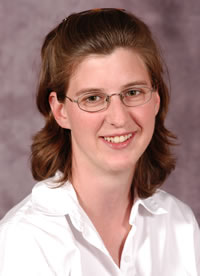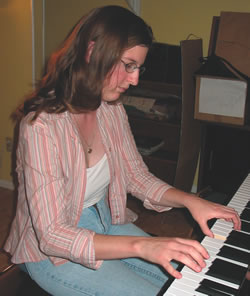Artist of the Month - September 2005 Sheila Strahan
- |
 September
in Moab evokes many pleasant thoughts – cooler temperatures
and new visitors foremost among them. For people who have at
least a ten-year history with this town, September has also
become synonymous with a premier cultural event, The Moab Music
Festival. Thanks to this gathering of professional musicians,
high-caliber artists continue to be drawn to this area, including
pianist, Sheila Strahan. September
in Moab evokes many pleasant thoughts – cooler temperatures
and new visitors foremost among them. For people who have at
least a ten-year history with this town, September has also
become synonymous with a premier cultural event, The Moab Music
Festival. Thanks to this gathering of professional musicians,
high-caliber artists continue to be drawn to this area, including
pianist, Sheila Strahan.Strahan recently relocated from Boulder, Colorado in May, making Moab her permanent home. She brings a host of musical and education talents which are enriching the community in multiple ways. The Moab Music Festival is the primary reason Strahan decided to make Moab her permanent home by employing her in two prominent positions, as Artistic Coordinator and Education Coordinator. Her involvement with the organization began with an internship in 2000. The following year, Strahan became the Artistic Coordinator, acting as the liaison between the musicians and the staff organizing the festival. She is responsible for arranging the contracts for the performers, setting up rehearsals and booking new artists as openings arise. As much as she enjoys the responsibilities of that position, she really lights up when talking about her other role in the festival. As Education Coordinator, Strahan gets to combine her interests and skills by bringing music and teaching together. Her main responsibility as Education Coordinator is to organize the annual assemblies for the Moab public schools. This year, she has helped select two varied segments. She explains her selections by saying, “I deliberately picked non-classical groups to emphasize the diversity of music.” The first selection is entitled “Swinging with Django,” which focuses on the pre-jazz era and the evolution of early jazz. This segment will be performed for the Middle and High Schools. Butch Thompson, an accomplished piano player whose performances include NPR’s “A Prairie Home Companion,” will play and talk about music in a question-and-answer forum.  The
second segment will be shown at the Red Rock and Helen M. Knight Elementary
Schools, and will be led by renowned Venezuelan flutist, Marco Granados.
He will teach kids Venezuelan rhythms and then ask them to accompany him
in an improvisational performance. The
second segment will be shown at the Red Rock and Helen M. Knight Elementary
Schools, and will be led by renowned Venezuelan flutist, Marco Granados.
He will teach kids Venezuelan rhythms and then ask them to accompany him
in an improvisational performance. Strahan’s enthusiasm over exposing local schoolchildren to such accomplished musicians and diverse music is infectious. I’m ready to sneak into the assemblies, until I realize that I could take the more dignified approach of watching these performers as part of The Moab Music Festival. Her interest in all aspects of music is reflected in both her repertoire as a pianist and her pursuit of a Master’s degree in Musicology, which she is currently earning from the University of Colorado at Boulder. Strahan is focusing on music history, in particular women composers. She obviously draws great inspiration from these female musicians, who lived independent, creative lives, much like the one Strahan pursues. By having her identify qualities about two of her favorite composers, one can see what traits she admires and has naturally cultivated within herself. The first female composer she discusses is Louise Farrenc, a French pianist who taught at the Paris Conservatory and specialized in chamber music, particularly “romantic, sweeping piano parts.” The second woman she attributes a dignified hero-worship of is Clara Schumann, who, according to Strahan, was a better pianist than her well-known husband, Robert. Schumann outlived her husband and managed to support their eight children on her virtuoso performances, despite the male-centric times she lived in. Strahan is clearly taken as much with the women’s musical talents as with the strength and independence they displayed in their personal lives. Strahan exhibits the same qualities in herself that she admires in these female composers. Her deft hands show off her musical ability on the piano, as she plays a diverse repertoire ranging from classical to New Age to rag time to folk music. Her hands look feminine and delicate, yet move quickly and with force, qualities that can easily be used to describe Strahan’s personality. Although she still performs, her passion for the piano has expanded to helping others learn how to play. She is, at heart, a teacher. Strahan’s goal is to spread music to people of all ages. She advertises her services as a piano teacher under the name of Desert Child Music, and claims to accept ages 4 to 104. Perhaps that sounds a bit facetious, but considering Strahan’s openness to diversity and her passion for music and teaching, she probably does accept students between that wide age range. Her teaching style follows the Suzuki Method, whose philosophy is based on the precept that every child is capable of learning any language by being immersed in it from an early age, and therefore, every child is capable of learning music by also being surrounded by it when young. By including the parents in the lessons, Strahan instructs them in how to become the teacher during the rest of the week between lessons. She does not consider herself a strict Suzuki teacher, however, because she is more willing to introduce the skill of reading music earlier than the method generally encourages. Having majored in Music Education at Northern Arizona University, where she earned her Bachelor’s of Arts, she is cognizant and accepting of the different learning styles people respond to. Some students are audio learners and thrive off listening to CDs and others are visual, and respond better to seeing the music represented in notes. Because Strahan was not taught how to read music until the age of twelve, she considers herself slower than most professional pianists. Her highly attuned ear compensates and she can generally play a piece after hearing it. Her ability to listen and discern is not solely relegated to music. I find it easy to imagine Strahan as an effective teacher as I notice how carefully she listens to my questions and thinks about the responses. Her eight years of teaching piano, five of which were full-time, have also attuned her to working with students. Her attentive personality makes it easy to believe that her classes do fulfill her claim of “promoting a joyful and heart-filled experience.” Strahan’s accomplishments as a pianist are impressive, but her involvement with music on so many levels speaks for how far her passion stretches and how well she has found her calling. For those interested in pursuing piano lessons with Sheila Strahan, she can be contacted at (435) 259-3470 or at sheila@desertchildmusic.com. |